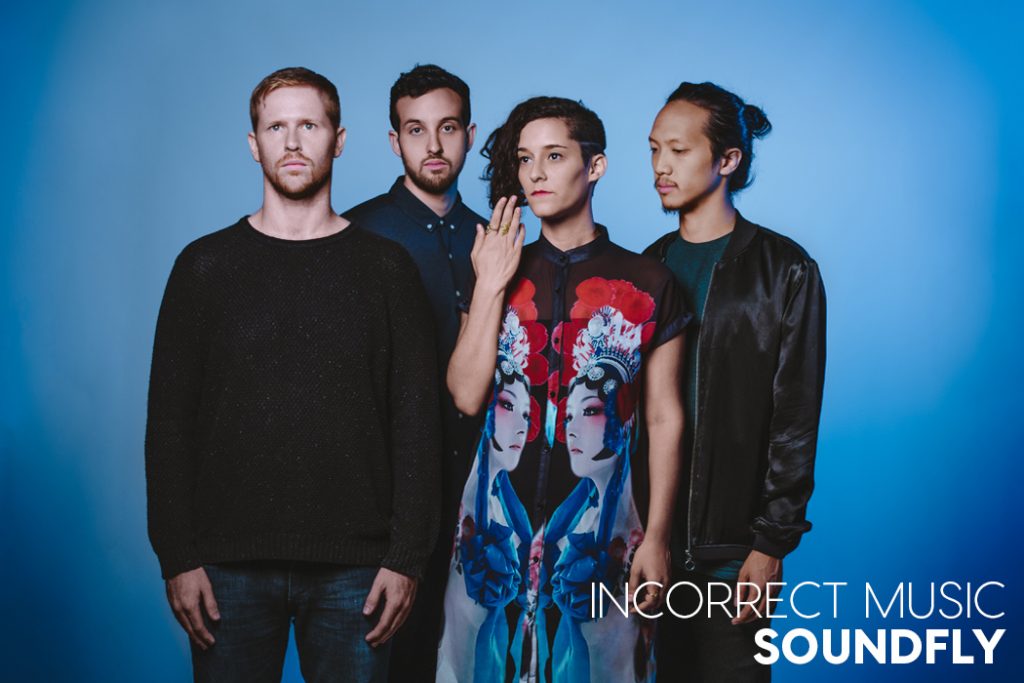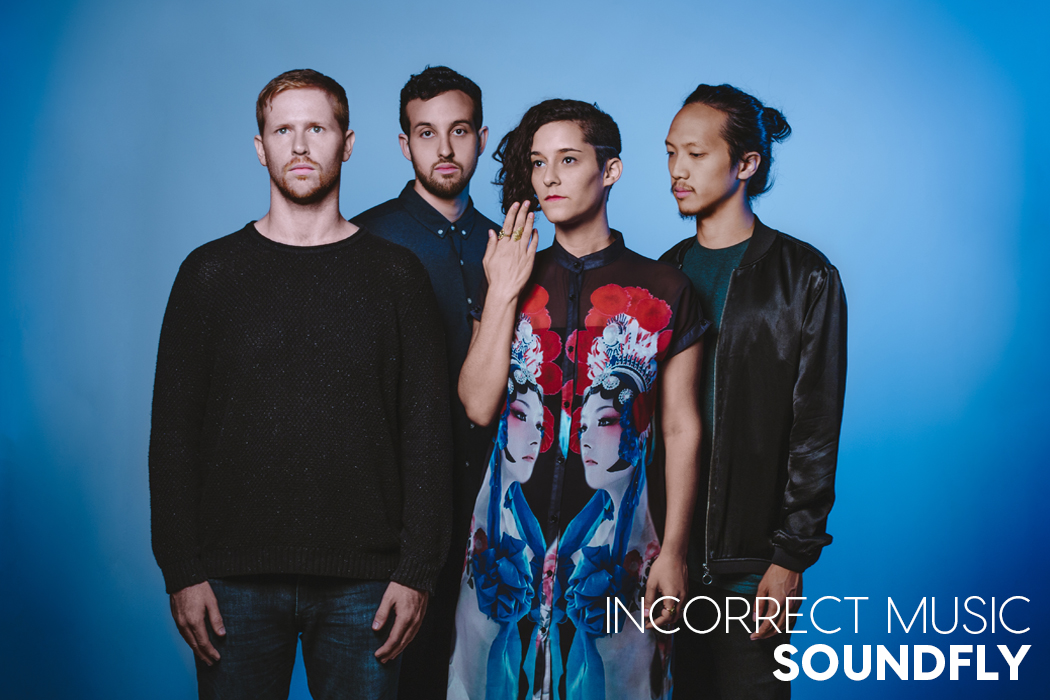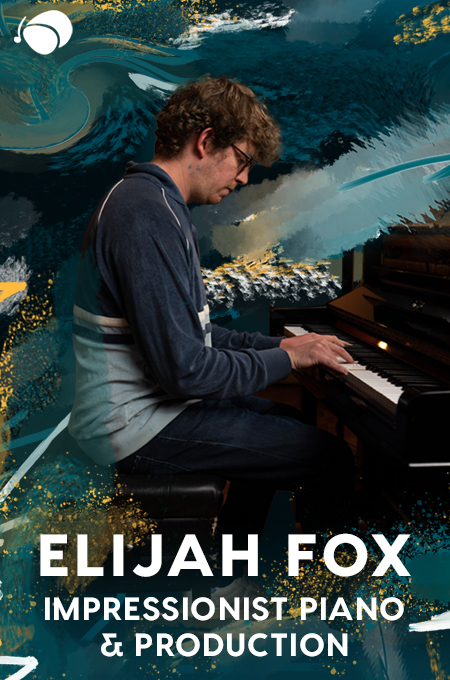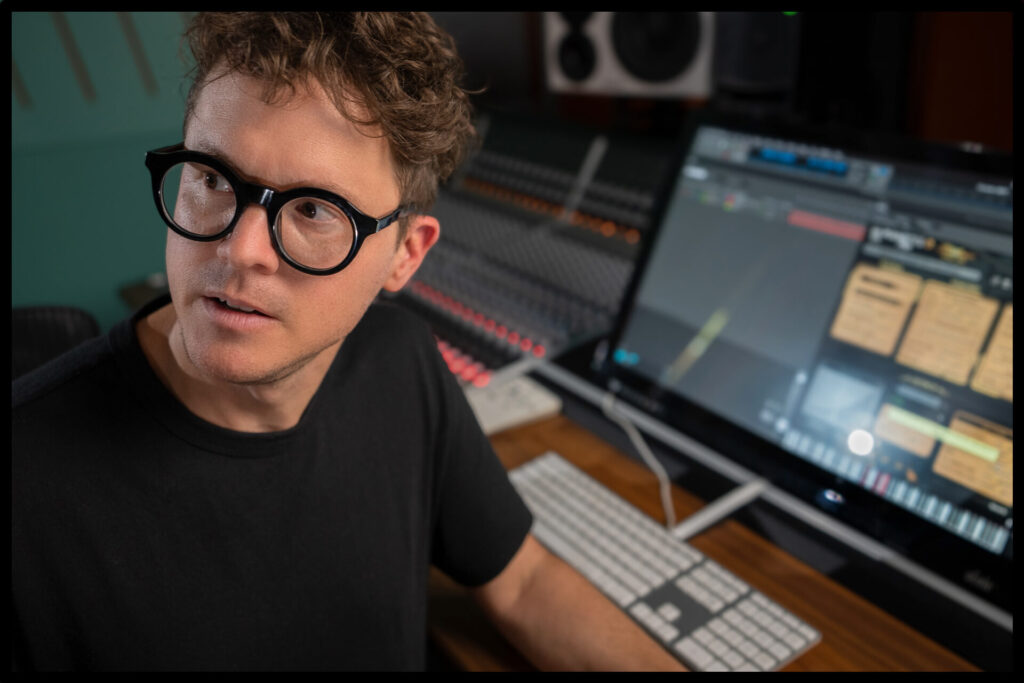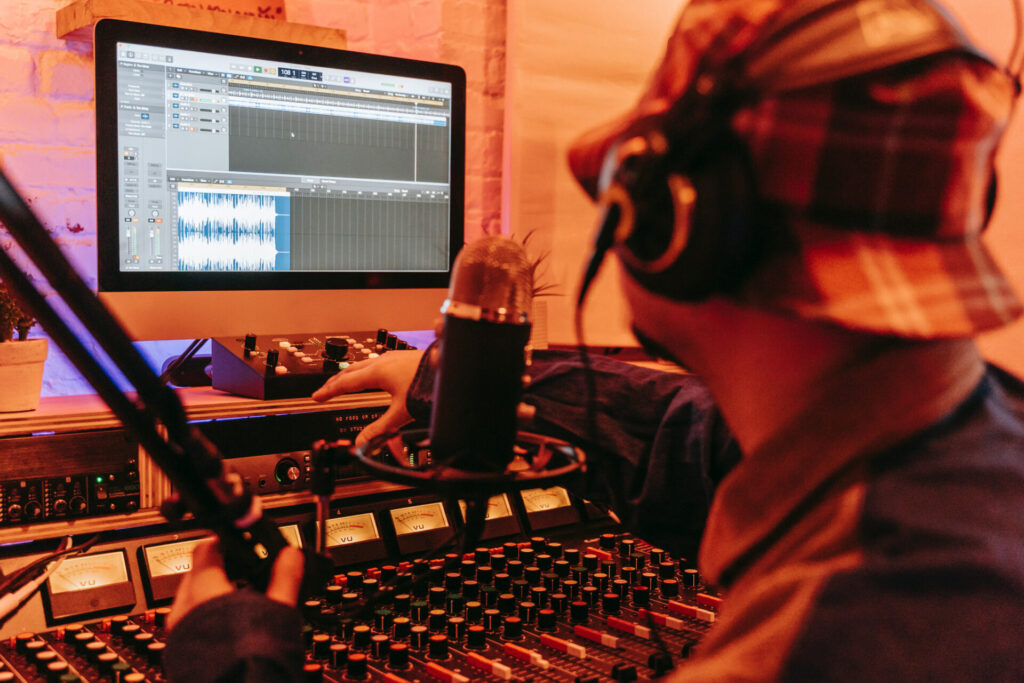Welcome back to Soundfly’s weekly interview series, Incorrect Music, curated by guitarist, singer, and composer Lora-Faye Åshuvud (of the band Arthur Moon). In this series, we present intimate conversations with artists who are striving to push the boundaries of their process and craft.
Recently, I was talking with Asher Kurtz and Ella Joy Meir (one half of Iris Lune) about the evolution of their co-writing, and they joked that conflict — both musical and interpersonal — plays an integral role in their composing process together. To my ear, Iris Lune’s music actually circles around this tension, which Ella calls the “continuous ebb and flow that shifts our individual boundaries.”
It’s the alchemy of two people (four, actually, with Aaron Liao on bass and Angelo Spampinato on drums) coming together with very distinct perspectives and a deep, shared goal. You can never quite put your finger on what the two (or ten) things are that push so beautifully against each other in their music, because once you finally grasp where the friction is, they’ve introduced some new component — a fresh contradiction poking its way through the surface of their rich, dramatic electro-indie songcraft.
Let me add this: My band, Arthur Moon, spent two weeks on tour with Iris Lune this past winter. It was one of those shoestring tours with some really big highs and one or two nights where everything seemed to go exactly the way we hoped it wouldn’t — empty rooms, misogynist sound engineers, etc.
But every night when we got onstage, Iris Lune stood at the front of the room (even when they were our whole audience) and danced and sang along. It reminded me why I started playing music in the first place; not to do the industry “right,” or play the right venue pre-packed with fans of our genre, or crack some kind of mathematical code for writing a pop melody, or even to “win” at the business side of things. Iris Lune is a band with deep skill and knowledge, but they also know when to throw out the rules of formality and “hip” and just be big-hearted people in a room enjoying music. Their music reflects that. And these days, that’s the most lovely, “incorrect” thing I can imagine.
Iris Lune’s new single, “Lost in Chatter,” just dropped via Clash. If you’re in New York City, you can catch them perform at their EP Release Party at Baby’s All Right on December 6 with Mmeadows and Liptalk.
– Lora-Faye Åshuvud
Interview by Syl Dubenion
By sheer coincidence, I have the privilege of saying I went to school with you all at the Berklee College of Music. Knowing that you all crossed paths in some shape or form there, were there any indications that any of you would band together to become Iris Lune then, or was this a dream born and raised later in New York City?
Asher:
Angelo, Aaron, and I had played in a few different contexts together during our time in school. Ella and I met through a recording session that I was in the backing band for and really loved each other’s sound. We got together, improvised a bit, and quickly decided that we needed to start a group. Aaron was the obvious choice at the time on bass since Ella wanted a guy who could groove really hard but at the same time play with lots of subtlety. We went through a few drummers, but after my four years of working with Angelo in another band and his professionalism, creativity, and commitment to making everyone around him sound better, he was a clear choice as well. New York is where we became way more committed to making this happen.
Ella:
In the past year, we’ve become a lot more committed to one another. It always felt like family, but I feel like it’s on a whole other level now. The more I live in NYC, the more I realize how rare this is. Everyone is running around and trying to make their dreams come true; I’ve seen many projects fail because people lack time and commitment and just need to make ends meet. I’m grateful to be part of such a unique project and share my journey and vision with these three amazing guys.
Aaron:
The privilege is ours, Syl! We all ate those Berklee caf pizzas for years. We’re like family! Years prior to the band forming, Asher and I bonded over a shared love for both metal and jazz, and while we accompanied other projects together, it wasn’t until he invited me over to hear some material he was working on with a killer singer-songwriter (which was Ella) that I considered abandoning my plans to be a session musician in Los Angeles. The music just gripped me; I said yes and didn’t look back.
“The live thing is a place of constant experimentation and the recording process is about stating long term what we feel is the essence of the song.”
With bands, there is always some ambiguity from the audience’s perception of how much of a song is written by the front person and how much is put together collectively by the band. Keeping in mind that all the members of Iris Lune are studied musicians and have spent a significant amount of time working on their craft, how collaborative does the songwriting become with a group like yours?
Asher:
The band-writing dynamic has become more collaborative over the years, but Ella and I write most of the material. On this upcoming EP, we worked a lot with Zubin Hensler (of the Westerlies and twigtwig) who produced one of our singles, “Paper Mache,” and added a couple things on Ella’s production of “Son.” I’ve started doing a lot of the initial production work before bringing it to Ella, therefore writing and shaping things now more than ever.
Ella:
I’m a sound junkie. I love sampling and producing sounds, and many times, it’ll spark an entire song. “Surfaces” off of our first EP, and “Son” off of our upcoming one are perfect examples of that. As Asher said, our writing dynamic has changed a lot throughout the years. It started from songs I wrote in my bedroom and bloomed into a whole collaborative effort. The more we work together, the more each of us can find their place in this project. And it’s constantly changing.
This process has taught me the importance of letting go and being open to new angles, as well as knowing when to insist on what’s important to me and maintaining my own voice. It’s a fine line, but having the right partners makes this vulnerable place a beautiful playground.
I also want to mention the amazing Dalton Harts, who produced our first EP and two songs off of our upcoming EP. At this point, he has kind of become the fifth member of Iris Lune.
You all were on tour with Arthur Moon last winter. Your groups have very similar energies and momentums being from New York City while trying to carve out very specific paths for yourselves on your own terms. What was your experience teaming up with them on the road?
Angelo:
It was awesome being on the road with them; they’re great musicians and even greater people! It’s always great to be around like-minded musicians and to share the stage with them night after night. I’d love to do it again, and also I’d like to give a huge shoutout to Mia Min Yen for putting it all together!
Asher:
Ditto to what Angelo said. We love those peeps and have only gotten closer since that tour. There was a show in DC where the Iris Lune crew needed to go back to NY, and Lora-Faye asked if I’d be interested in hanging with them and sitting in on their set with my sampler (the Critter and Guitari “Organelle” which their guitarist Nick [Lerman] also has).
At this point, I could already sing every part of their set, so sitting in was easy. There were also a couple dates that Angelo had to miss due to another tour with Yoke Lore he was playing on, so Dave Palazola from AM learned our songs and filled in. Such an incredible time with incredible people.
Ella:
I was just hanging the other day with Lora-Faye, and we joked that Iris Lune is the twin sister of Arthur Moon. It was a perfect combo from the start and turned out to be a beautiful friendship.
Aaron:
Constant laughter. The best of vibes. This tour showed me how important positive energy is on the road. It’s tough enough juggling the logistics of being on tour, but having support around keeps you focused on the ups.
At your live shows, I’ve seen that the band members aren’t stuck with just one role musically. Aaron may ditch the electric bass for the synth bass, and Asher might put down the electric guitar for a keyboard, and both of them might join Ella to sing backup. Did you jump into performing shows with all these possibilities in mind?
Ella:
No, it was definitely a process. I think that the more we played together and felt comfortable with the music, the more we wanted to expand and try out new things. The background singing is pretty new, and the guys have been amazing with it. We’ve been working on blend and support, and sometimes we’ll start a rehearsal with a vocal warm up. A lot of people might be scared to pick up new roles, but it always feels like a such a safe and inspiring environment.
Aaron:
I think what you’re speaking of is a result of us chasing a sound and being open to learning new things. There’s always a choice between, “Welp, too bad we’re not….” or taking on the opportunity to acquire the ability and make it part of your skillset. One of the first elements that we took on in this manner was singing, but the list also includes synths (Asher and I both deepened our knowledge and obsession through Iris Lune), Ableton tracks, producing/mixing, and non-musical pieces like programming lights, social-media marketing, and merchandise management; side note, we are adding a peach hot sauce to our merch line, debuting at our EP release show at Baby’s (12/6)!
Asher:
I think a big part of live music nowadays is figuring out how to translate the recording to a live audience. Dissecting what we did on the record and trying to emulate those sounds live pushes us to experiment both on and off our instruments. When we started working on more electronic tracks, it became clear that we all needed to play a little synth. Backing vocals were something that we knew we should be doing early on but only in the last couple years really started taking seriously.
How does your live performance differ from or inform your studio recordings?
Angelo:
Personally, I think our live show is more intense and personal, and we generally use more acoustic elements for the live show. Also, something that I’ve enjoyed over the years, especially with songs from the first self-titled EP, is how certain songs evolve over time.
Aaron:
Both are their own game, but it’s all about moments. I think our fans relate to our vibe first and foremost and allowing everyone’s individual character to shine on their respective instruments supports that.
Asher:
This evolution Angelo is talking about is something that is natural and is bound to happen over time at least with this group. Our process used to be: play the songs live for a while, record those elements, spend forever in the mixing/production zone tweaking things until the song has completely evolved, and then figure out how to play that live. Now, it’s mostly just record/produce a track, send it around for feedback, and then figure out the best way to make those sounds live.
The live thing is a place of constant experimentation, and the recording process is about stating long term what we feel is the essence of the song.
At Soundfly, we love to use the term “Incorrect Music” to describe the things an artist does that go against people’s assumptions, or even their own instincts, but which yield exciting and unique results. What about your music might you consider to be “incorrect”?
Ella:
I love this term! I think every type of music should be partly “incorrect.” Since Iris Lune is a collaborative project, created by four people with very distinct tastes and ideas, I feel like it’s a constant give and take, a continuous ebb and flow that shifts our individual boundaries. This is part of what makes it so special though: The whole always ends up bigger than the sum of the individual parts.
Aaron:
I’ve never been in another musical situation combining lush, folky singing, jazzy chords, pop production, and quasi-metal breakdowns. My inner nerd would also like to say that we have an EDM song in 7/4 where I play slap bass. Something about that seems incorrect yet so correct at the same time. Gosh, that was cheesy.
Y’all have been on a steady rise in popularity for some time. (Congrats!) What are some other groups, New York-based and otherwise, that you have seen on the come up as well or have even kept you on your toes?
Angelo:
Arthur Moon, Anna Wise, Tei Shi, Ela Minus, and Nick Hakim are all NY-based artists that inspire me on a regular basis, and I’m always looking out for more!
Aaron:
Thanks. man! serpentwithfeet’s EP Blisters is one of the heaviest releases I’ve heard in a while. It’s epic, raw, and he takes the listener on an emotionally gripping roller-coaster ride. Angelo De Augustine sounds like Elliott Smith, Nick Drake, and Adrianne Lenker from Big Thief wrapped in one. I saw him open for Moses Sumney, and my friends had to help me pick my jaw off the floor after.
Asher:
Our old friends Bent Knee are one of the most inspiring groups I’ve ever seen live and are definitely on the up. Rahm, altopalo, Kalbells, and b o t are friends that are making moves and some inspiring music as well.
How would you describe your dream audience?
Ella:
People with huge ears and big hearts. At the end of the day, you just want to connect with people and share your take on the world, hoping that it’ll move the insides of someone. If the song doesn’t cut through, it doesn’t matter how many time changes or guitar solos you have. We try to be as honest as we can with our music, and I think that if someone can feel that — we want them in the audience.
Aaron:
For me, great music transcends music itself and is almost like looking into a mirror via someone else’s story. Music has the power to bring up childhood memories you thought you forgot about, to reconnect with old friends, to cook, to go on an impromptu four-hour bike ride, to go live life. People who resonate with our music on this level is what I’d consider to be our “dream audience” if we have one. Especially if they like hot sauce.
“Our writing dynamic has changed a lot throughout the years. It started from songs I wrote in my bedroom and bloomed into a whole collaborative effort. The more we work together, the more each of us can find their place in this project. And it’s constantly changing.”
Your latest single, “Paper Mache,” has such a mesmerizing, yet familiar, feeling to it. Is there any special story behind this tune and its creation?
Ella:
“Paper Mache” talks about how we sometimes try to control our inner monsters or darkness with external things. The character in the song is struggling with loving herself, with all of her quirky weirdness, and uses external actions to help her find that love (“counting the lights on my way out” or “turn off the phone, make it stay out”). She finally settles on a “paper-mache love” — homemade, seemingly beautiful and strong, but actually very fragile and unstable. This love that she’s created will fall apart; it’s made of paper and water. She will only have true comfort once she releases this false consolation and accepts that she can’t control things.
I have some experience with these kinds of feelings. As a kid, I was very neurotic and felt I had to do certain things to make sure everything would be all right: say good night in Hebrew and English both, touch all the walls as I passed by them, do things symmetrically on both sides of my body, etc. As an adult, I’ve learned how to release these needs but when I’m especially stressed, they can return to some extent.
This dialogue with my inner demons has two sides to it. The first is talking to myself and trying to convince myself that I don’t need to control all of these external things. The second is accepting that I’ll always have these urges within me and accepting my strangeness/quirkiness. At the end of the day, it’s all about the process you work through with yourself. Others can help guide you through it, but you have to believe you can change whatever’s bothering you and make it happen.
How will your upcoming second EP differ from your debut? What’s your message to the world this time around?
Ella:
We’ve grown a lot as a group and as individuals since the first EP. This new one is a lot more collaborative, and in a way, marks a pivotal moment in our life as a band. The music this time around is a lot groovier, but the songs are still pretty dark. I’ve done a lot of work digging inwards and connecting with my own monsters. In a way, it’s therapeutic, and it’s beautiful to see how they can turn into butterflies if you just give them a chance. Take “Lost in Chatter,” for instance. It’s a very dancey tune, but when you listen carefully to the lyrics, you realize it’s a lot darker. I guess that’s just life, right? Dark and dancey. Deep and colorful.
Aaron:
It’s normal to be weird! Live your life!
Want to get all of Soundfly’s premium online courses for a low monthly cost?
Subscribe to get unlimited access to all of our course content, an invitation to join our members-only Slack community forum, exclusive perks from partner brands, and massive discounts on personalized mentor sessions for guided learning. Learn what you want, whenever you want, with total freedom.
